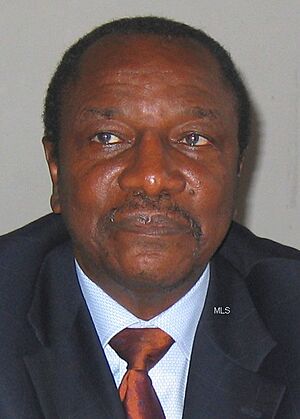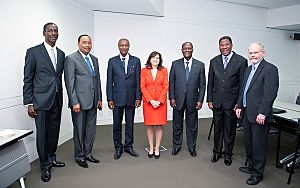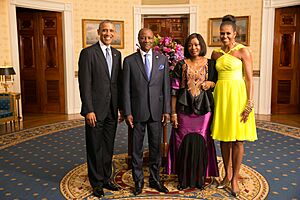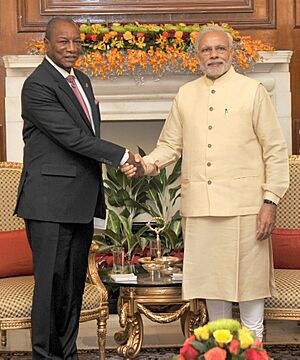Alpha Condé facts for kids
Quick facts for kids
Alpha Condé
|
|
|---|---|
| ߊߟߑߝߊ߫ ߞߐ߲ߘߍ߫ | |
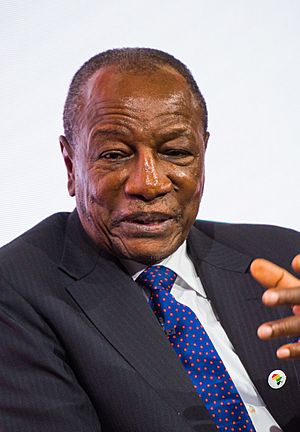
Condé in 2020
|
|
| 4th President of Guinea | |
| In office 21 December 2010 – 5 September 2021 |
|
| Prime Minister | Jean-Marie Doré Mohamed Said Fofana Mamady Youla Ibrahima Kassory Fofana |
| Preceded by | Sékouba Konaté (acting) |
| Succeeded by | Mamady Doumbouya (interim) |
| 15th Chairperson of the African Union | |
| In office 30 January 2017 – 28 January 2018 |
|
| Preceded by | Idriss Déby |
| Succeeded by | Paul Kagame |
| Personal details | |
| Born | 4 March 1938 Boké, then part of French Guinea |
| Political party | Rally of the Guinean People |
| Spouse |
Djene Kaba
(died 2023) |
| Education | Sciences Po Pantheon-Sorbonne University |
Alpha Condé (born 4 March 1938) is a politician from Guinea, a country in West Africa. He served as the fourth president of Guinea from 2010 to 2021. Before becoming president, he spent many years as an opposition leader. He tried to become president several times but was not successful until 2010.
In the 2010 election, Condé was elected president. He promised to make Guinea a stronger democracy and to fight against corruption. When he took office in December 2010, he became the first president in Guinea's history to be freely elected by the people. He was re-elected in 2015 and again in 2020. The 2020 election followed a change to the country's constitution. This change allowed him to run for more terms, which caused many protests. On 5 September 2021, the military in Guinea arrested Condé and took over the government.
Contents
Early Life and Education
Condé was born on 4 March 1938 in Boké, which is in a region of Guinea called Lower Guinea. His parents were from a country that is now known as Burkina Faso.
When he was 15 years old, Condé moved to France. There, he was involved in student groups. He studied political science and wrote a master's thesis in 1965.
Early Political Career
Condé first ran for president in Guinea's first multi-party election on 19 December 1993. He received 18 percent of the votes. The election was won by Lansana Conté, who had been president since 1984. Condé's supporters believed there were problems with the election results.
He ran for president again in 1998 and came in third place. A few days after this election, Condé was arrested. He was accused of trying to leave the country illegally and trying to gather people to cause problems for the government.
Condé's trial began in April 2000. He and 47 other people were accused of hiring fighters and planning to harm President Conté. The trial faced many delays. In September, Condé was sentenced to five years in jail.
However, President Conté pardoned Condé in May 2001. This meant he was released from jail, but he was not allowed to be involved in political activities. After his release, he went to France and returned to Guinea in July 2005.
After President Conté passed away and a military takeover happened in December 2008, Condé met with the new military leader, Moussa Dadis Camara. Condé initially said that the military leaders were "patriots."
Presidency (2010–2021)
Becoming President in 2010
Condé ran for president again in the 2010 election. In the first round of voting, he received 18 percent of the votes. Another candidate, Cellou Dalein Diallo, received more votes. However, after a second round of voting, Condé was declared the winner on 15 November 2010, with 52.5 percent of the votes.
After becoming president, Condé worked to improve Guinea's mining laws. He wanted to reduce corruption in the mining industry and increase the country's share of the profits.
Attempted Attack in 2011
On 19 July 2011, Condé's home was attacked. One of his guards died, and two others were hurt. Condé survived the attack. A former army chief and a presidential guard member were arrested soon after. Condé told the country that his plans for reform would continue.
Later, more than 40 soldiers were arrested in connection with the attack. The United Nations said that this event showed that Guinea needed to make its military stronger and safer.
Protests Before the 2013 Election
Condé faced criticism during protests in early 2013. These protests happened because opposition supporters were concerned about the fairness of the upcoming parliamentary election. The opposition groups stopped participating in the election process because they were worried about how the voter list was being created.
The protests led to violence, and many people were hurt or died. Voting finally took place on 28 September. Observers noted that there were many problems with the election process. These issues caused a three-week delay in announcing the results.
Ebola Outbreak Response
During the 2014 Ebola epidemic that affected West Africa, Condé's government initially seemed to downplay the seriousness of the outbreak in Guinea. Some researchers suggested this was because the government wanted to attract foreign investments, especially in mining.
In response to the outbreak, Condé's government put in place travel bans and quarantine rules. The epidemic caused harm to Guinea's economy. Condé was hopeful that Guinea would receive financial help from other countries to recover from the epidemic. He also met with experts to discuss the Ebola vaccine.
Re-election in 2015
On 17 October 2015, Condé was re-elected for his second term as president. He received about 57.85 percent of the votes. The election had some issues, but Condé was sworn in for his second term on 14 December 2015.
Protests in 2019–2020
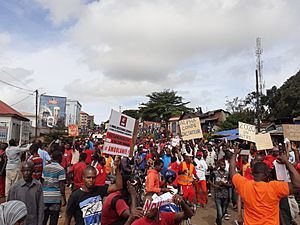
From 2019 to 2020, there were many protests in Guinea against Condé's rule. These protests began on 14 October 2019, because people were unhappy about proposed changes to the constitution. During these protests, many people lost their lives.
2020 Election and Overthrow
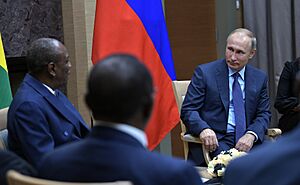
Condé won a third term in the October 2020 presidential election. He stated that a constitutional vote in March 2020 allowed him to run again, even though there was a two-term limit before. The opposition groups did not accept the results, and more protests happened across the country.
On 5 September 2021, Condé was captured by the military, and his government was overthrown. The military's Special Forces announced that they had taken control. Lieutenant-Colonel Mamady Doumbouya, the head of the Special Forces, said that the military took action because of government corruption and poor management.
Condé was later released from military custody and went to stay at his wife's home in Conakry.
Awards and Honours
National Honours
Foreign Honours
Personal Life
Condé is a Muslim. He was married to Djene Kaba Condé until she passed away in 2023. He has one son, Alpha Mohamed Condé.
|
See also
 In Spanish: Alpha Condé para niños
In Spanish: Alpha Condé para niños


